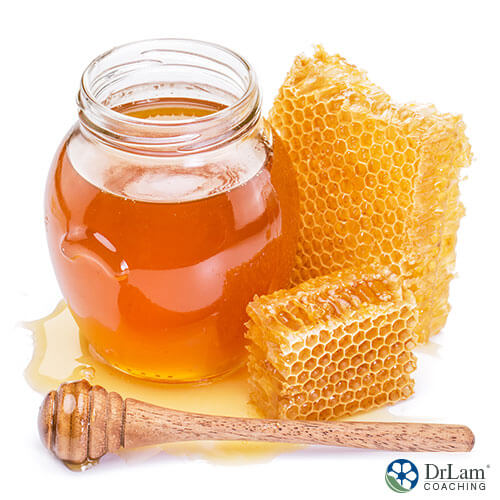 For thousands of years, honey was the only source of concentrated sugar humans had access to. However, honey is much more than a sweetener. It is a powerful anti-inflammatory agent, and its healing properties have been successfully used in traditional medicine for hundreds of years. Thanks to the pro-inflammatory modern diet and hectic lifestyles, we are exposed to more inflammation-causing toxins than ever. The toxins we absorb through the air, water, and food we eat often lead to chronic, low-level inflammatory processes that we are not even aware of.
For thousands of years, honey was the only source of concentrated sugar humans had access to. However, honey is much more than a sweetener. It is a powerful anti-inflammatory agent, and its healing properties have been successfully used in traditional medicine for hundreds of years. Thanks to the pro-inflammatory modern diet and hectic lifestyles, we are exposed to more inflammation-causing toxins than ever. The toxins we absorb through the air, water, and food we eat often lead to chronic, low-level inflammatory processes that we are not even aware of.
If left unaddressed, low-level chronic inflammation can easily develop into something more serious, such as autoimmune disorders, heart conditions, cancer, stroke, Alzheimer's, or diabetes. The worst thing about this stealthy "disease of civilization” is that it has a tendency to slowly but steadily destroy health, causing permanent damage to vital organs and weakening the immune system.
Fortunately, there are many ways to reduce inflammation, although most of them are not so sweet. Honey is not only a nutritious and delicious food, but it also comes with many medicinal benefits.
Honey contains more sugar than ordinary white sugar, but many people are switching to it. This is not because they want to give up white sugar (which they should), but because honey has powerful anti-inflammatory properties, and holistic practitioners consider it one of nature's best all-around remedies.
Your lifestyle and diet, particularly inflammatory foods, can greatly affect how fast an inflammatory process develops or if it develops at all.
A diet to reduce inflammation typically consists of lots of fruits and vegetables (the more colorful, the better), plant-based proteins, healthy fats, avocado, cold-water fish, whole grains, and herbs and spices such as turmeric, ginger, cinnamon, oregano, rosemary, and lavender.
Honey can be an excellent addition to a healthy diet such as this. If possible, you should choose dark, raw honey as it contains more nutrients, enzymes, and antioxidants. The most nutritious honey comes when the bees forage from plants not treated by synthetic pesticides, and the honey is neither heated nor filtered.
High-quality, medicinal honey has been used to aid gastrointestinal issues, dress and disinfect burns and wounds, soothe sore throat and coughs, fight aging naturally, and reduce inflammation.
What gives honey such powerful anti-inflammatory properties is a protein called apalbumin 1, which bees create while producing honey. This protein is found in honey and pollen, and it's able to stop the inflammation that white blood cells create.
While honey is a great remedy, it is also very high in sugar and calories. Because of this, the risks of eating too much honey are the same as eating too much sugar: weight gain, increased blood sugar levels, insulin resistance, and others. Honey is rich in simple sugars (fructose and glucose) that provide almost instant energy, but you should not allow your sugar levels to spike because of too much honey. Keeping your blood sugar levels stable is the best way to control hunger and prevent both mood swings and energy crash. Thus, keep in mind that honey is a great remedy in moderation.
 Inflammation can affect almost any organ, such as inflammation of the heart (myocarditis), inflammation of the tubes that transport air to the lungs (asthma), or inflammation of the kidneys (nephritis). However, most people experience inflammation through various types of arthritis, fibromyalgia, or low back and neck pain. Chronic stress is one of the top things that contributes to inflammation in the developed world.
Inflammation can affect almost any organ, such as inflammation of the heart (myocarditis), inflammation of the tubes that transport air to the lungs (asthma), or inflammation of the kidneys (nephritis). However, most people experience inflammation through various types of arthritis, fibromyalgia, or low back and neck pain. Chronic stress is one of the top things that contributes to inflammation in the developed world.
Inflammation begins when your body tries to protect itself from invading pathogens or to respond to stress, physical or emotional. For example, physical trauma may make your arm swell, but an argument may give you a headache. Whenever your body reacts to stress, regardless of how it reacts, an inflammatory process follows. To ease the inflammatory process, the adrenals start pumping cortisol, the anti-stress hormone.
If you have to deal with situations that cause inflammations on a regular basis, such as a stressful job, relationship conflict, or sports injuries, your adrenals will have to work overtime to produce enough cortisol to help you cope with the stress you're constantly exposed to. Sooner or later they will wear out, making it hard for you to cope with even mild stress, or you may develop serious stress-related disorders high blood pressure, heart conditions, or adrenal fatigue.
Frequent exposure to inflammation-causing situations increases the chances that inflammation will become chronic. Although acute inflammation is not bad, and your body needs it in order to heal, chronic inflammation is a different matter.
Some of the common symptoms of a chronic inflammatory process are food sensitivity, frequent infections, leaky gut, and irritable bowel syndrome. The standard American diet and a sedentary lifestyle are major culprits for the unprecedented spread of inflammation-related diseases.
To avoid such health problems or to help your body recover from them, adopting an anti-inflammatory diet is one of the best first steps you can take toward health.
The increasing pressure that people now live with means that the epidemic of adrenal fatigue caused by chronic stress is very real and spreading fast. Although many stressors are beyond our control, such as job insecurity, rising living costs, or relationship conflict, there are still many things you can do to ease the stress you are exposed to. One of the easiest changes you can make is to improve your diet.
Along with diet changes, adopting an anti-inflammatory lifestyle incorporating regular physical activity, adequate sleep, and regular relaxation practices and self-care can go a long way in keeping inflammation under control.
Using naturally grown, unfiltered honey is just another tool in your kit for living a healthier lifestyle.
© Copyright 2020 Michael Lam, M.D. All Rights Reserved.
Honey is rich in antioxidants, enzymes, and antibacterial and anti-inflammatory agents, that gives not only an instant energy boost but also the nutrients necessary to fight the side effects of a stressful lifestyle. However, honey is best used in moderation, as it does still contain a lot of sugar.
